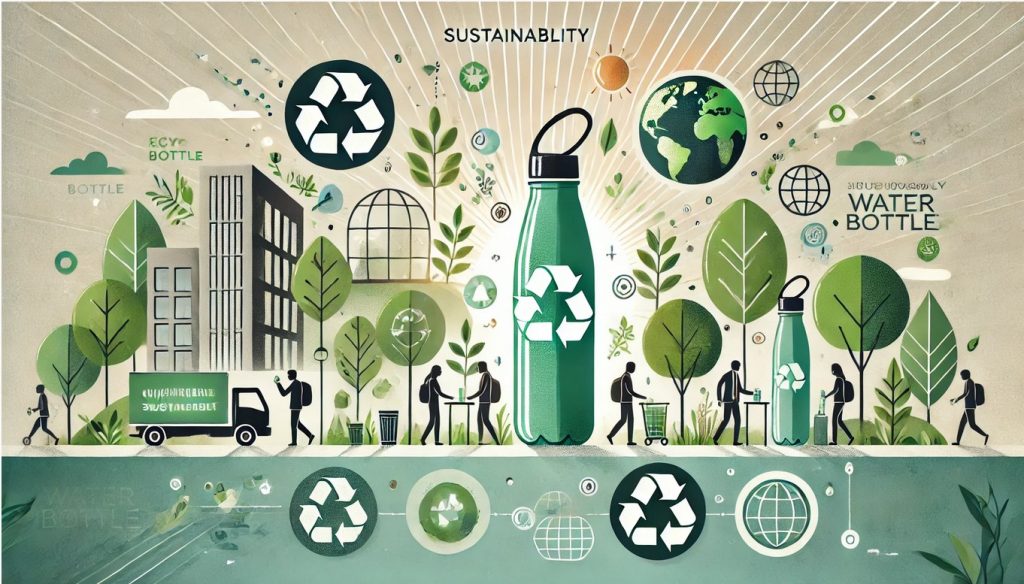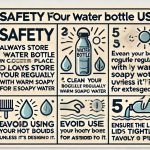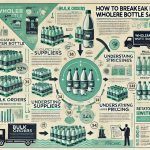The Rising Demand for Sustainable Products
In recent years, sustainability has evolved from a buzzword to a driving force in consumer purchasing decisions across many industries. Consumers are becoming more conscious of the environmental impact of their purchases and are increasingly seeking products that reflect their values of sustainability and eco-friendliness. This shift is particularly notable in sectors such as fashion, technology, food, and everyday consumer goods, including water bottles.
Water bottles, which are often used daily and are part of the growing issue of plastic pollution, have become a focal point in the movement towards more sustainable living. The growing demand for eco-friendly alternatives has pushed brands to rethink their approach, innovate, and offer products that align with consumers’ environmental concerns. Sustainable water bottles—made from materials like stainless steel, glass, or BPA-free plastics—are now a popular choice for consumers who want to reduce their carbon footprint and make more responsible purchasing decisions.
For water bottle manufacturers and sellers, understanding why sustainability matters to customers is key to meeting this demand and positioning your brand as a leader in the eco-conscious market.
The Growing Concern for the Environment
The Global Problem of Plastic Waste
Plastic pollution is one of the most pressing environmental challenges of our time. According to recent studies, approximately 8 million metric tons of plastic enter the oceans every year, posing severe risks to marine life, ecosystems, and human health. The proliferation of single-use plastic bottles is a significant contributor to this crisis, with billions of plastic bottles being used and discarded globally each year.
For environmentally conscious consumers, the impact of plastic on the planet is a major consideration when making purchasing decisions. Many people are seeking ways to reduce their reliance on disposable plastic items, including plastic water bottles, by opting for more sustainable alternatives. The growing awareness of the plastic waste crisis has led to a greater demand for reusable, eco-friendly water bottles made from materials that have a lower environmental impact.
Climate Change and Resource Conservation
Climate change has become a central concern for consumers, businesses, and governments worldwide. The impact of rising temperatures, severe weather events, and resource depletion is prompting more individuals to take action in their daily lives to mitigate environmental harm. As part of their efforts, many consumers are turning to sustainable products that are designed to conserve resources and reduce their carbon footprint.
Water bottles made from sustainable materials, such as stainless steel or glass, are seen as a practical way to contribute to the fight against climate change. These materials are often more durable and longer-lasting than plastic, which means fewer resources are required for manufacturing, transportation, and disposal. In addition, many sustainable water bottles are designed to be reusable for years, reducing the need for constant production and consumption of single-use plastics.
Supporting Circular Economy Principles
The concept of a circular economy, where products are designed for reuse, repair, and recycling, has gained traction in recent years as a solution to reduce waste and improve resource efficiency. Consumers are increasingly aware of the benefits of supporting companies that prioritize sustainable, closed-loop production processes. By investing in sustainable water bottles, customers are supporting a system where products are not discarded after one use, but are kept in circulation for as long as possible through reuse, recycling, and responsible disposal.
This growing interest in circular economy practices has led many water bottle brands to adopt environmentally friendly production processes, such as using recycled materials, offering recycling programs for used bottles, and ensuring that their products can be easily recycled at the end of their lifecycle.
The Role of Sustainable Water Bottles in Consumer Purchasing Decisions
Consumer Preferences for Eco-Friendly Products
Consumers, particularly younger generations like Millennials and Gen Z, are increasingly motivated by sustainability when making purchasing decisions. Studies show that a large percentage of consumers are willing to pay a premium for eco-friendly products that align with their values. Sustainable water bottles, which are reusable, durable, and made from materials like stainless steel, bamboo, or recycled plastic, are a clear example of this shift in consumer preferences.
For these consumers, buying sustainable products is not just about making a smart purchase—it’s about aligning their purchasing behavior with their environmental beliefs and taking a stand against plastic waste. Many consumers are also motivated by the desire to live healthier lifestyles, as many sustainable water bottles are BPA-free and made from non-toxic materials. As the awareness of plastic’s harmful effects on both health and the environment continues to grow, more customers are gravitating towards reusable, sustainable alternatives.
Ethical Consumption and Brand Loyalty
Sustainability is not just a trend but a reflection of changing societal values. As consumers increasingly prioritize ethical consumption, they are more likely to support brands that demonstrate a commitment to environmental and social responsibility. Brands that make sustainability a core part of their mission often build strong relationships with their customers, resulting in increased loyalty and advocacy.
Sustainable water bottles are more than just a product; they are a statement about the brand’s values. Consumers are drawn to companies that are transparent about their sustainability efforts, such as using eco-friendly materials, reducing waste, and engaging in fair labor practices. Brands that actively promote their sustainability initiatives and take steps to reduce their environmental impact are more likely to attract customers who share these values, leading to higher customer retention and increased sales.
Transparency and Trust
In a world where consumers are becoming more informed and skeptical about greenwashing (the practice of making misleading claims about a product’s environmental benefits), transparency is essential for building trust. Consumers are increasingly looking for brands that provide clear, honest information about the sustainability of their products, including sourcing, manufacturing processes, and end-of-life disposal options.
Water bottle companies that clearly communicate their sustainability practices, such as using recycled materials or adopting carbon-neutral production methods, are more likely to gain the trust of their customers. Providing third-party certifications (such as Fair Trade, B Corp, or Carbon Neutral) can also enhance the credibility of a brand’s sustainability claims, helping to foster long-term customer loyalty.
Sustainable Materials and Design Features in Water Bottles
Eco-Friendly Materials: Stainless Steel, Glass, and Bamboo
The materials used in water bottle manufacturing play a key role in their sustainability. Many water bottle brands are moving away from traditional plastic bottles, which are a major source of waste and pollution, and instead using more sustainable alternatives. Stainless steel, glass, and bamboo are three popular materials used in eco-friendly water bottles.
Stainless Steel Water Bottles
Stainless steel is one of the most durable and sustainable materials used in water bottles. Stainless steel bottles are highly resistant to corrosion, easy to clean, and long-lasting. Unlike plastic, stainless steel doesn’t leach harmful chemicals like BPA, making it a safer choice for consumers. It is also fully recyclable at the end of its lifecycle, making it a more eco-friendly option compared to single-use plastic bottles.
Glass Water Bottles
Glass is another sustainable material often used in water bottles. Glass bottles are non-toxic, reusable, and can be easily recycled. Many consumers appreciate the purity of glass, which doesn’t retain odors or flavors, making it an ideal option for those who are health-conscious. While glass bottles are more fragile than stainless steel, their sustainability is unquestionable, and many brands offer protective sleeves to reduce the risk of breakage.
Bamboo Water Bottles
Bamboo is a renewable resource that is increasingly being used in the production of water bottles and accessories. Bamboo water bottles are lightweight, durable, and biodegradable. While not as common as stainless steel or glass, bamboo is gaining traction as an eco-friendly alternative in the water bottle market. Additionally, many bamboo water bottles incorporate other sustainable materials like stainless steel for insulation or glass for the bottle itself.
BPA-Free Plastics and Recycled Materials
For customers who prefer plastic water bottles, many brands now offer bottles made from BPA-free plastics and recycled materials. BPA (Bisphenol A) is a chemical commonly found in plastics that has been linked to health concerns, including hormone disruption. As consumers become more health-conscious, the demand for BPA-free water bottles has increased.
Brands that use recycled plastics in their water bottles help to reduce the amount of plastic waste in landfills and oceans. By creating bottles made from post-consumer recycled (PCR) plastics, brands are not only reducing their carbon footprint but also contributing to the circular economy. Recycled plastic bottles can be made from previously used materials, helping to conserve virgin resources and reduce energy consumption in the manufacturing process.
Design for Longevity and Reusability
A key feature of sustainable water bottles is their design for longevity and reusability. Many eco-friendly bottles are built to last for years, with durable construction that can withstand daily use, rough handling, and exposure to the elements. Brands that emphasize durability in their designs encourage consumers to use the bottle repeatedly, reducing the need for disposable plastic bottles.
In addition, many water bottles are designed to be easily cleaned, often being dishwasher-safe or coming with removable parts that make maintenance simple. Some brands offer lifetime warranties or satisfaction guarantees, further reinforcing the long-term value of their products.
Reducing Carbon Footprint Through Sustainable Manufacturing
Sustainability goes beyond the materials used in the product itself—it also encompasses the manufacturing process. Water bottle brands that prioritize sustainability often take steps to reduce their carbon footprint during production. This includes using renewable energy sources, minimizing waste, and optimizing transportation to reduce emissions.
Brands that are committed to sustainability should also consider adopting environmentally friendly practices in their packaging, distribution, and supply chain. For example, using recycled or biodegradable packaging materials, minimizing plastic waste, and sourcing materials from ethical suppliers are all ways to enhance a brand’s overall environmental responsibility.
The Marketing Power of Sustainability
Telling the Story of Sustainability
In a crowded marketplace, effective communication of a brand’s sustainability efforts is crucial for standing out. Water bottle brands that prioritize sustainability should actively tell their story through marketing campaigns, social media posts, product descriptions, and packaging. By sharing the steps they take to reduce their environmental impact, brands can engage with customers on a deeper level and build stronger relationships.
One effective strategy is to highlight the story behind the materials used in the product, such as showcasing the sustainable sourcing of stainless steel or the eco-friendly processes behind manufacturing. Brands can also use storytelling to explain the environmental benefits of reusable water bottles compared to disposable plastic bottles, helping customers understand the tangible impact of their purchasing decisions.
Building Brand Loyalty Through Sustainability Initiatives
Sustainability initiatives can also be used to build brand loyalty. Many consumers feel good about supporting companies that are committed to environmental causes. By offering customers the opportunity to participate in sustainability programs, such as bottle recycling initiatives, charity donations, or eco-friendly product swaps, brands can deepen their connection with customers.
For example, a brand might partner with environmental organizations to plant a tree for every water bottle sold, or provide discounts for customers who send back used water bottles for recycling. These initiatives not only boost brand loyalty but also encourage customers to feel like they are part of a larger movement toward environmental change.
The Power of Social Responsibility and Consumer Advocacy
As sustainability becomes an integral part of modern consumer culture, customers are increasingly using their purchasing power to advocate for positive change. Water bottle customers are more likely to align with brands that actively support social responsibility and environmental causes, whether through donations, community engagement, or transparency in operations.
By positioning your water bottle brand as a leader in sustainability and aligning it with environmental causes, you tap into a powerful network of like-minded customers who are passionate about making a difference. These customers are not just buying a product—they are investing in a brand that reflects their values, which can translate into greater brand advocacy and long-term customer loyalty.







